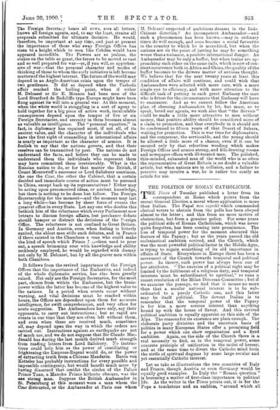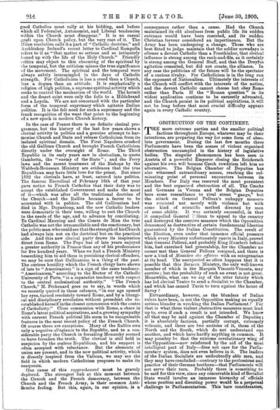THE POLITICS OF ROMAN CATHOLICISM. T HE Tinzes of Tuesday published
a letter from its correspondent at Rome which points from the recent General Election a moral whose application is more than Italian. The Papal non, expedit which commanded clerical voters to abstain from the polls has been obeyed almost to the letter ; and this from no mere motive of obstruction, but from a genuine policy. For some years the political side of Roman Catholicism, which was never quite forgotten, has been coming into prominence. The loss of temporal power for the moment obscured this feature of the Papacy ; but as the years passed the old ecclesiastical ambition revived, and the Church, which was the most powerful political factor in the Middle Ages, is trying to regain something of its old importance in affairs of State. Everywhere in Europe there has been a movement of the Church towards temporal and political power. In theory, such power has always been one of her attributes. "The exercise of a political right may be limited by the fulfilment of a religious duty, and temporal interests must be subordinated to spiritual," so runs a recent resolution of the Milan Diocesan Committee ; but if we examine the passage, we find that it means no more than that a secular national interest is to be sub- ordinated to a purely Catholic one, and this latter may be itself political. The devout Italian is to remember that the temporal power of the Papacy is for him a more serious interest than anything bound up with the house of Savoy. And this revived political ambition is equally apparent on this side of the Alps. The reasons for its existence are plain enough. The elaborate party divisions and the uncertain basis of politics in many European States offer a promising field. for a power which can show organisation and a fixed ambition. Again, on the side of the Church there is a real necessity to find, as in the temporal power, some concrete principle of unification in the midst of heresy, and at the same time to divert the Catholic mind, from the strife of spiritual dogmas by some large secular and yet essentially Catholic interest.
Let us take as illustrations the two countries of Italy and France, though Austria or even Germany would be equally good examples. In Italy the "Roman question" is becoming a matter of first-class importance in political life. As the writer in the Times points out, it is for the Pope a touchstone and an emblem, "around which all good Catholics must rally at his bidding, and before which all Federalist, Autonomist, and Liberal tendencies within the Church must disappear." It is no casual graft upon Church policy, but the very root of it. The Milan resolution calls it a part of "Catholic doctrine," and Archbishop Ireland's recent letter to Cardinal Rampolla refers to it as "that matter so serious and so intimately bound up with the life of the Holy Church." Friendly (Thies may object to this obscuring of the spiritual by the temporal, but the criticism misses the true significance of the movement. The spiritual and the temporal were always subtly intermingled in the days of Catholic strength. For Catholicism is less a creed than a Church, less a dogma than an attitude. It is emphatically a religion of high politics, a supreme spiritual activity which seeks to control the mechanism of the world. The hermit and the desert saint were only the foils to a Hildebrand and a Loyola. We are not concerned with the particular form of the temporal supremacy which agitates Italian politics. It is the felt need for such a supremacy and the frank recognition of the want that point to the beginning of a new epoch in modern Church history.
In the case of France there is no definite clerical pro- gramme, but the history of the last few years shows a clerical activity in politics and a genuine attempt to har- monise Church and State and release Catholicism from its isolated spiritual domain. The First Napoleon crushed the old Gallican Church and brought French Catholicism directly under the oversight of Rome. The Third Republic in its early years saw in clericalism, to quote Gambetta, the "enemy of the State" ; and the Ferry laws and the recent treatment of the Bishops by the Waldeck-Rousseau Ministry are evidences that the true Republican may have little love for the priest. But since 1892 the clericals have, at least, entered into politics. The famous Encyclical of February 16th of that year gave notice to French Catholics that their duty was to accept the established Government and make the most of it—which was after all the traditional doctrine of the Church—and the Rallies became a factor to be accounted with in politics. The old Gallicanism had died in Mgr. Dupanloup, and the new Catholic leaders were democratic in their tone, willing to suit the Church to the needs of the age, and to advance by conciliating. To Cardinal Manning and the Comte de Mutt the true Catholic was not the irreconcilable and the reactionary, but the politic man who could see that the strength of his Church had always lain not on the doctrinal but on the practical side. And this new clerical party draws its inspiration direct from Rome. The Pope has of late years enjoyed a greater authority in France than any of his predecessors for five hundred years. When we find a French Ministry beseeching him to aid them in punishing clerical offenders, we may be sure that Gallicanism is a thing of the past. The curious hostility which the French clergy have shown of late to "Americanism" is a sign of the same tendency. "Americanism," according to the Rector of the Catholic University of Paris, "is a separatist tendency with respect to the central ecclesiastical authority." "The French Church," M. Pechenard goes on to say, in words which we recently quoted in these columns, "in our age opened her eyes, turned resolutely toward Rome, and by a liturgi- cal and disciplinary revolution without precedent she re- established herself inthe closest communion with the centre of Catholicity." Close communion with Rome, a share in Rome's latest political aspirations, and a growing sympathy with current French political life seem to be recognisable features in the most recent policy of the French Church. Of course there are exceptions. Many of the Rallies own only a negative allegiance to the Republic, and to a con- siderable party the Church in forsaking Monarchy seemed to have forsaken the truth. The clerical is still held in suspicion by the zealous Republican, and his support is often accepted with reluctance. But the elements of union are present, and in the new political activity, which is directly inspired from the Vatican, we may see the field in which modern Catholicism proposes to make its conquests. One cause of this rapprochement must be gravely deplored. The strongest link at this moment between the Church and the French democracy, between the Church and the French Army, is their common Anti- Semite feeling. But this, again, in our opinion, is a consequence rather than a cause. Had the Church maintained its old aloofness from public life its sudden entrance would have been resented, and its sudden Christian fervour considered an impertinence. But the Army has been undergoing a change. Those who are best fitted to judge maintain that the soldier nowadays is oftener a devout Catholic than a Freethinker, that clerical influence is strong among the rank-and-file, as it certainly is strong among the General Staff, and that the Dreyfus agitation cemented, but did not create, the alliance. In any case the politician of the future will be the spectator of a curious rivalry. For Catholicism is in the long run the opponent of Nationalism. Ultimately the interests of the Church will conflict with the interests of the nation, and the devout Catholic cannot choose but obey Rome rather than Paris. If the "Roman question" in its widest application continue to be earnestly advocated, and the Church persist in its political aspirations, it will not be long before that most crucial difficulty appears again in every Catholic country.



















































 Previous page
Previous page